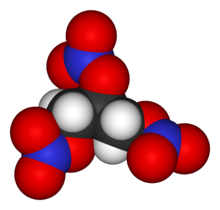Gliceril trinitrat (farmakologija)
Izgled

| |||

| |||
| Klinički podaci | |||
|---|---|---|---|
| AHFS/Drugs.com | trinitrate (pharmacology).html Monografija | ||
| Identifikatori | |||
| CAS broj | 55-63-0 | ||
| ATC kod | C01DA02 C05AE01 | ||
| PubChem[1][2] | 4510 | ||
| DrugBank | DB00727 | ||
| ChemSpider[3] | 4354 | ||
| UNII | G59M7S0WS3 | ||
| ChEBI | CHEBI:28787 | ||
| ChEMBL[4] | CHEMBL454110 | ||
| Hemijski podaci | |||
| Formula | C3H5N3O9 | ||
| Mol. masa | 227,087 | ||
| SMILES | eMolekuli & PubHem | ||
| |||
| Farmakoinformacioni podaci | |||
| Trudnoća | ? | ||
| Pravni status | |||
Gliceril trinitrat (GTN) je alternativno ime za hemikaliju nitroglicerin. Ovo jedinjenje se koristi za tretiranje angine i zatajenja srca. U upotrebu je ušlo 1879. godine. Uprkos duge istorije, mehanizam formiranja azot-monoksida (NO) iz GTN i metaboličke posledice ove bioaktivacije još uvek nisu u potpunosti izučene.
Gliceril trinitrat je organsko jedinjenje, koje sadrži 3 atoma ugljenika i ima molekulsku masu od 227,087 Da.
| Osobina | Vrednost |
|---|---|
| Broj akceptora vodonika | 9 |
| Broj donora vodonika | 0 |
| Broj rotacionih veza | 8 |
| Particioni koeficijent[5] (ALogP) | 5,8 |
| Rastvorljivost[6] (logS, log(mol/L)) | -3,8 |
| Polarna površina[7] (PSA, Å2) | 165,1 |
- ↑ Li Q, Cheng T, Wang Y, Bryant SH (2010). „PubChem as a public resource for drug discovery.”. Drug Discov Today 15 (23-24): 1052-7. DOI:10.1016/j.drudis.2010.10.003. PMID 20970519.
- ↑ Evan E. Bolton, Yanli Wang, Paul A. Thiessen, Stephen H. Bryant (2008). „Chapter 12 PubChem: Integrated Platform of Small Molecules and Biological Activities”. Annual Reports in Computational Chemistry 4: 217-241. DOI:10.1016/S1574-1400(08)00012-1.
- ↑ Hettne KM, Williams AJ, van Mulligen EM, Kleinjans J, Tkachenko V, Kors JA. (2010). „Automatic vs. manual curation of a multi-source chemical dictionary: the impact on text mining”. J Cheminform 2 (1): 3. DOI:10.1186/1758-2946-2-3. PMID 20331846.
- ↑ Gaulton A, Bellis LJ, Bento AP, Chambers J, Davies M, Hersey A, Light Y, McGlinchey S, Michalovich D, Al-Lazikani B, Overington JP. (2012). „ChEMBL: a large-scale bioactivity database for drug discovery”. Nucleic Acids Res 40 (Database issue): D1100-7. DOI:10.1093/nar/gkr777. PMID 21948594.
- ↑ Ghose, A.K., Viswanadhan V.N., and Wendoloski, J.J. (1998). „Prediction of Hydrophobic (Lipophilic) Properties of Small Organic Molecules Using Fragment Methods: An Analysis of AlogP and CLogP Methods”. J. Phys. Chem. A 102: 3762-3772. DOI:10.1021/jp980230o.
- ↑ Tetko IV, Tanchuk VY, Kasheva TN, Villa AE. (2001). „Estimation of Aqueous Solubility of Chemical Compounds Using E-State Indices”. Chem Inf. Comput. Sci. 41: 1488-1493. DOI:10.1021/ci000392t. PMID 11749573.
- ↑ Ertl P., Rohde B., Selzer P. (2000). „Fast calculation of molecular polar surface area as a sum of fragment based contributions and its application to the prediction of drug transport properties”. J. Med. Chem. 43: 3714-3717. DOI:10.1021/jm000942e. PMID 11020286.
- Hardman JG, Limbird LE, Gilman AG. (2001). Goodman & Gilman's The Pharmacological Basis of Therapeutics (10 izd.). New York: McGraw-Hill. DOI:10.1036/0071422803. ISBN 0-07-135469-7.
- Thomas L. Lemke, David A. Williams, ur. (2007). Foye's Principles of Medicinal Chemistry (6 izd.). Baltimore: Lippincott Willams & Wilkins. ISBN 0-7817-6879-9.

